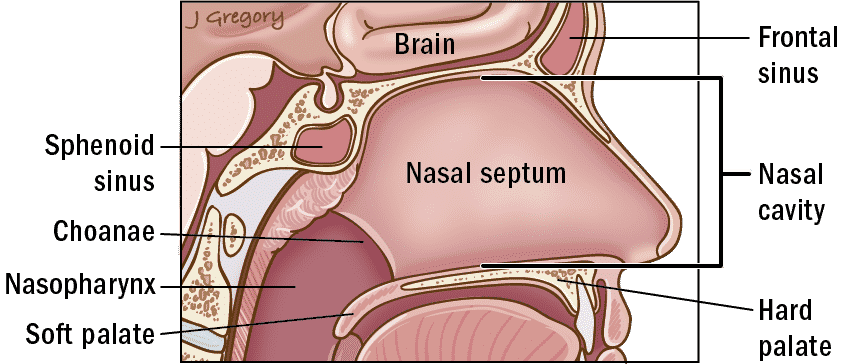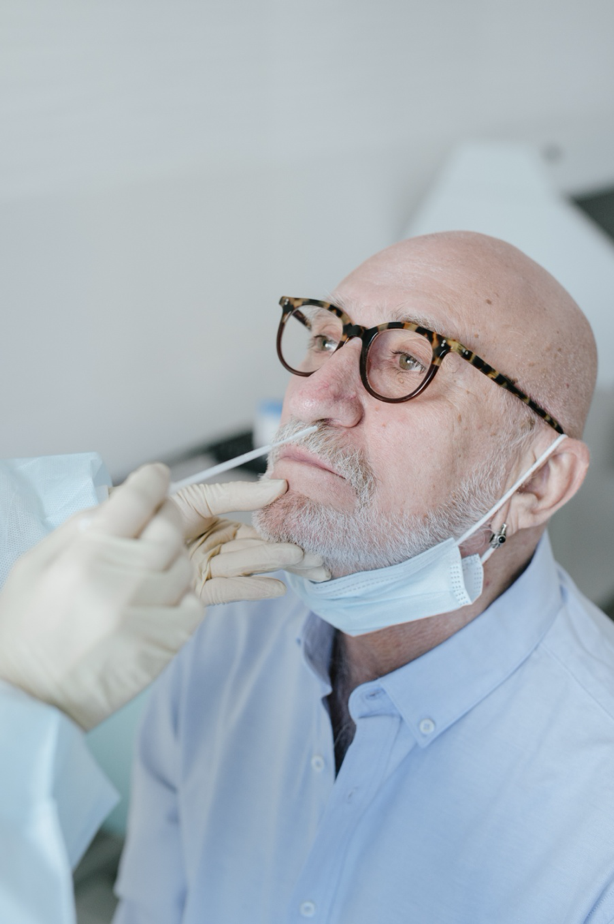What services does an ENT doctor provide for the nose? Normally, you will go to your primary healthcare provider for nose problems such as nasal congestion, drips, or chronic sore throats. After the checkup, your general physician might suggest you see an ENT specialist, i.e., an ear, nose, and throat doctor. They specialize in the treatment of various conditions related to these body parts.

(Source)
Otolaryngologists/ENT doctors have the advanced knowledge and training that help them to diagnose any ear, nose, and throat diseases successfully. Their areas of focus are the head and neck parts of the body (excluding the eyes and the brain), and they also perform numerous surgeries.
ENT doctors will often treat and manage the cancer symptoms in their patients along with tumors, nasal cavity infections, nose deformities, etc.
What Nose Disorders and Diseases Does an ENT Doctor Treat?
Allergies
Did you know that it is vital to see an ENT doctor when you are struggling with conditions like seasonal rhinitis, dust allergies, and hay fever? Many people do not know this because the symptoms affect their throat and nose, which lead to nasal congestions and/or sore throats.
On the other hand, an ENT specialist has the expertise to determine the reasons behind your allergies. Moreover, as they specialize and train in this subspecialty of otolaryngology, they will prescribe the most effective medication and treatment options for nasal problems.
Besides, the ENT specialists do not only treat and diagnose nose diseases. They specialize in ear infections, sinusitis, tumors, tinnitus, etc. Therefore, in order to get the best treatment, your general doctor will recommend an ENT doctor.
Nasal Polyps
Nasal polyps are a condition in which inflammation occurs inside your nasal canals, also causing soft growths. This makes breathability difficult and results in discomfort. Subsequently, you might also suffer from a stuffy nose that is quite common in people with asthma or allergies. An ENT specialist is the best person to treat the problem compared to a general medical practitioner.
Allergic Rhinitis
Allergic rhinitis refers to the inflammation of the nose’s linings (inner). The common symptoms of this chronic nose disease include sneezing, congestion, itchiness, and clear mucous in the nasal passage or your mouth. There are two types of allergic rhinitis.
- Perennial: Occurs upon exposure to certain allergens that may trigger allergic reactions, such as dust, pollens, pet hair, dander, etc.
- Seasonal: Occurs due to cyclical changes and variations in the surrounding environment (i.e., hay fever).
What Else Does an ENT Doctor Treat?
Here are some other conditions that an ENT doctor may treat:
- Cerebral Spinal Fluid Leakage
- Infections of the head and neck
- Deviated Septums
- Chronic Sinusitis
- Fungal Sinusitis
- Triad Asthma
- Nasal Fractures
- Inverting Papilloma- tumor of the nose
- Nasal Masses
- Meningoencephalocele
- Nosebleeds
However, not many people are aware of their healthcare requirements when they experience the symptoms associated with these diseases, such as those affecting the nose and ear chronically.
Treatments an ENT Doctor Offers
Here are a few of the extensive range of medicinal and surgical treatments that an ENT doctor can offer.
Sinus Surgeries
- Image-Guided Surgery: it involves the use of tomography (CT) scans that help in identifying the problems and anatomy of the sinuses. Consequently, they are able to offer safe results by maintaining the safety of the sinus linings through visual images. Hence, they also remove minimal tissue to offer relief and counter the health problem.
- FESS (functional endoscopic sinus surgery): such endoscopic surgeries involve the use of small telescopes to see through the nostrils into the sinus cavities. Following that, other instruments might come in handy based on your chosen ENT’s surgical techniques and experience.
Medicine for Sinusitis
The most common types of treatments begin with the prescription of medication and pharmaceutical drugs. For instance, the ENT specialist may prescribe a decongestant to help you relieve any nasal congestions or nasal cavity masses symptoms.

(Source)
Moreover, they might also prescribe over-the-counter nasal washes to treat the nose and nasal cavities. Antibiotic therapies are a common approach for both acute and chronic conditions that cause pain and discomfort. For example, with sinusitis, once you start taking the prescription drugs, you also have to avoid the triggers and allergens.
Here is an example of the treatment options a reliable ENT doctor may suggest:
- For fungus, they may prescribe antifungal drugs
- For allergies, they may suggest using antihistamine
- For immune deficiencies, they may prescribe medicines to help your body fight foreign organisms
ENT Services for the Nose: Conclusion
Do you often suffer from nasal congestion? Do you have any nose or ENT-related disorder or disease? At Ear, Nose & Throat of New York, we have one of the best ENT doctors in NY State, Dr. Michael C. Burnett.
Check out our official website to learn more about the ENT treatments Dr. Michael has to offer. Give us a call at 212-644-8350 to inquire further or book an appointment with our ENT specialist. We provide medications, prescriptions, and other treatments according to your specific condition.
Reference Links:
https://www.everydayhealth.com/ear-nose-throat/specialist.aspx
https://www.webmd.com/cold-and-flu/ear-infection/otolaryngologist-ear-throat
https://www.webmd.com/allergies/sinusitis-and-sinus-infection
https://www.webmd.com/a-to-z-guides/what-is-an-ent-ear-nose-throat-doctor
https://www.healthgrades.com/right-care/ear-nose-and-throat/8-reasons-to-see-an-ear-nose-and-throat-doctor
https://www.everydayhealth.com/ear-nose-throat/specialist.aspx











